#yes it's long
Explore tagged Tumblr posts
Link
“I am going to kill you.”
Pedro Pascal says this to me with a smile, which doesn’t mean that he’s joking. We’re sitting across a table from each other and occupying two of the twenty seats at the tiny Tokyo Record Bar on MacDougal Street in Greenwich Village. A few days earlier, I had polled a handful of clued-in New Yorkers with the following question: “What’s a good vinyl bar to take Pedro Pascal to?” Unanimous answer: Tokyo Record Bar! I was imagining a chill lounge space where we’d have some privacy to talk, play a few records, and maybe drink a little tequila. Pascal thought that’s what it would be like, too. Which is not a coincidence—because that’s what I told him.
But Tokyo Record Bar is not that kind of place at all. Instead, it’s a (very good!) seven-course meal in a (very cool!) basement with a (very delicious!) sake pairing. Meanwhile, it’s six-thirty in the evening, and Pascal’s got dinner plans with his “very bossy, please don’t print that” little sister, Lux, at eight. The clock is ticking, and now we’re locked into a whole experience. It feels a bit like the world’s grooviest hostage crisis.
But it is an experience, and we’re going to enjoy it. A reggae cover of Michael Jackson’s “Don’t Stop ’til You Get Enough” spins on the turntable, and we sing along because it’s impossible not to. We are suddenly aware that we’re easily the oldest patrons in the house. “Is anyone in here thirty?” he asks, subtly gesturing around the room. “Maybe, but for sure nobody here is forty,” I answer. The sake arrives, we fill each other’s cups, we say cheers, his friendly eyes light up, and he leans in to tell me something.
Just then the music stops mid-song. “ALLL RIIIIIIGHT!” hollers our hostess from the center of the room. “HOW ARE WE DOOOOINNNGGGG?!?” Pascal’s eyes meet mine and widen as she explains the rules of the place—how to make song requests, what we can do with ourselves if we have any food allergies we failed to disclose when we made the reservation, that the main rule is to HAVE FUN!!!—with the peppy energy of an improv teacher. This is going to be a Whole Thing.
“I was about to tell you that I was kidding and I’m not going to kill you,” Pascal says as the hostess finishes her introductory remarks and Reggae Michael lurches back into gear. I nod, and he nods. He waits a beat. “But I am going to kill you.”
You do not want Pedro Pascal to want to kill you. And it’s not because he has convincingly played some cold-blooded killers onscreen over the past several years. No, what you—all of us, apparently—want is simply more Pedro Pascal in your life. Because if you’re like 99 percent of the population with access to premium streaming TV right now, you can’t get enough of him. And you want him to be your hero or your fashion muse or your pal or maybe even your daddy. He’s a sex symbol and a serious actor in one friendly but unknowable, cuddly but perhaps slightly dangerous package. One of one.
To say that Pascal is having “a moment” doesn’t quite do justice to the kind of exceedingly rare, career-transforming period of cultural resonance that he’s experiencing. After spending much of his twenties and thirties living the life of a struggling actor, Pascal, at forty-eight, has suddenly been propelled to a lofty new level of fame. His face has been familiar for years. There was the short arc on Game of Thrones that ended with his character’s memorable skull-crushing death, for instance. And his role as a relentless DEA agent for a few seasons on Netflix’s early prestige-era Narcos. But his life has been changed by a pair of blockbuster TV series: This winter he captivated viewers in the role of Joel, an antihero survivor in a postapocalyptic America, in season 1 of HBO’s runaway hit The Last of Us. Then he returned for a third season playing the title character on Disney+’s The Mandalorian. In one he defends a surrogate daughter in a world ravaged by fungus-powered zombies. In the other he protects Baby Yoda (aka Grogu) from Imperial Forces and other threats.
Each of these franchises is a massive piece of intellectual property: a video-game adaptation and a Star Wars spin-off, respectively. Rather than getting lost in all the noise and effects, Pascal has managed to craft characters that provide the emotional center to the storytelling—elevating both the shows and himself in the process. “He’s a part of some spectacularly successful things,” says his longtime friend and fellow actor Sarah Paulson. “But sometimes in those situations, the show is the superstar. It’s really exciting to see that he is the thing that is becoming the superstar out of this.”
It’s an uncommon mix of qualities that may account for Pascal’s near-universal appeal. “I’ve always said there are two kinds of actors: There are actors you feel slightly intimidated by, and then there are actors you want to take home and hug and give some soup,” says Craig Mazin, a creator and executive producer of The Last of Us. “And he’s both. Somehow he’s both.”
Things are moving at a speed that would be destabilizing for someone less prepared to handle the success. But Pascal gives every impression of being comfortable at the center of the whirlwind. Over the course of a few lengthy conversations—and seven tasty courses at Tokyo Record Bar—he reflects on his long road to stardom, his peripatetic life, and what might be next for him. Whereas many actors his age may credit their homelife with keeping them grounded, Pascal does not have kids or even a steady home of his own these days. There’s an apartment in L. A. that has sat empty while he’s been working on sets in far-flung locations like Canada, Europe, and Pittsburgh. “I had a moment of thinking, You’re in your forties and you don’t own a home? Grow up. But I’m relinquishing expectations around what it is to be middle-aged and what it means to be fully grown up,” he says. “Why am I trying to force a square shape into a triangle?”
And then he sighs and puts it simply: “I just don’t want to make any decisions.”
The streets of New York City typically offer celebrities a degree of anonymity. Actors and rock stars alike blend into the flow, and busy New Yorkers either don’t notice their presence or feign indifference. Pascal used to live in the city, and while he’s had a few years of being famous (“Around 2014, I started to feel some people’s facial expressions change around me on the train”), right now is a new thing. The usual rules don’t apply. Virtually everyone he passes is very much aware of him, and he’s increasingly attuned to that reality. He walks with his shoulders back and straight, his stride quick and decisive, but his head just slightly down. A couple times per block, someone will pass him, turn around, and approach to ask for a picture. And a good half of them say a version of this: “I’m just so happy about what’s happening for you right now.” Frequently those exact words in that exact order. A lot of people do this. Pascal is gracious to each one—he maintains eye contact, he connects, and the fan leaves happy. He’s grateful for the love he feels, but to an observer, it’s easy to see how the intrusion could start to become problematic at some point.
Our dinner at Tokyo Record Bar is happening exactly a week after Pascal hosted Saturday Night Live for the first time, and he’s still recovering. “I’m usually not all that interested in challenging myself,” he says unconvincingly. He mentions a few exceptions, such as shooting The Last of Us for twelve months in Alberta and going toe-to-toe with his idol (“my god”) Nicolas Cage in last year’s The Unbearable Weight of Massive Talent. “SNL was all of those challenges stuffed into one week of my life,” he says. Then he smiles and adds: “I could not have had a better time.”
If you saw it, you know how true that is. “Anybody who watched that episode,” says Pascal’s close friend Oscar Isaac, “I mean, how could you not just fall in love with him? I think that’s why there’s so much goodwill, because you can feel that big heart bursting inside that chest of his.”
What is in Pascal’s chest at the moment is mucus. He’s a little bit under the weather, with a cold that’s been lingering since he woke up from the SNL after-party. He’s going to need to rest, but there’s no telling when that will happen. He has ongoing press for The Last of Us, as well as The Mandalorian to promote. And in May, he’ll be in Cannes for the premiere of Strange Way of Life, a western short he filmed last year with Ethan Hawke and famed director Pedro Almodóvar. In the movie, Pascal and Hawke play former gunslingers who rekindle an old friendship—possibly of the romantic variety. Almodóvar raves about Pascal. “I asked Pedro to play someone solid, emotional, crafty, a cheat if necessary, warmhearted,” he says. “And he played all those nuances with incredible ease. He can be adorably sentimental and hard as nails. He’s a great comic actor, and he can also be impenetrable if necessary.”
But the most important thing this week is that Pascal’s family—including his older sister, Javiera, and his younger brother, Nicolás—is flying in from all over the world to watch Lux, who will soon be getting her M.F.A. from Juilliard, perform in Ayad Akhtar’s The Who & the What. There are dinners to plan, hotel rooms to sort out. He is desperate not to let anyone down. And he wants to maximize his time with Lux, whom he hasn’t seen since he was in New York for a movie premiere last year. “I get anxious about when I’ll be back again,” he says. “So I’m just trying to see her as much as possible.”
In 1976, when he was just nine months old, his mother and father—she was a child psychologist and he was a fertility doctor—fled Chile to escape the dictatorship of General Augusto Pinochet, who’d seized power two years earlier. They got asylum in Denmark, then moved to the U. S. and initially settled in San Antonio. The family later moved to Orange County, California, when Pedro was eleven. He’s flipped between the east and west coasts ever since.
Pascal pulls out his iPhone to scan the QR code for Tokyo Record Bar’s sake menu. The picture on his lock screen is of Prince, mid-eighties, mid–guitar solo. His parents took him and his older sister to a movie theater in San Antonio to see what Pascal accurately calls “the very rated-R Purple Rain” in 1984. His dad loved to go to the movies. “My mother had too restless a mind for that, an artist’s mind,” he says. “But in that theater, she fell in love with Prince.” So young Pedro fell in love with the movies and with Prince.
His mother would drop him off at the movie theater in the morning and tell the staff she’d pick him up at six. And a kid can watch Raiders of the Lost Ark only so many times. “I saw The Big Chill,” he says, “and there was this joke about herpes, which I had no idea what that was, but everyone laughed, so I laughed. You want to keep up.” He saw the trailer for the Coen brothers’ Blood Simple. Heavy stuff. “It was exciting not getting it. Knowing that that was the thing that was waiting for you.”
After Daft Punk and A Tribe Called Quest, Pascal’s song comes on. It’s “Come See About Me” by Diana Ross and the Supremes. His shoulders bounce. His expressive eyes express joy. “Come see about me, leave me alone, come see about me, leave me alone.” He laughs. “That’s my catchphrase.” When I look down, I notice that he has snuck his third course, a (very tasty!) lettuce wrap, onto my plate. Sleight of hand. I will be eating for two tonight so that he can bring an appetite to the family dinner. “This will be your first exposure to my evil,” he says.
The song wakes a memory up. “My mom did have that blouse from The Big Chill, though. The vintage one. Here, let me look it up.” I know which one he means, but he Google Image searches anyway, and suddenly we’re two middle-aged guys bopping to Diana Ross and yelling excitedly about JoBeth Williams. He is maybe back on the fence about killing me.
Another one of the grown-up movies Pascal watched with his family was the 1982 Costa-Gavras film Missing, a thriller based on true events and set in the Pinochet-era Chile his parents had left behind. There’s an extremely tense scene in which Sissy Spacek’s character is stuck in the city after curfew. “She reminds me of my mom. She’s not a hundred pounds, five-foot-two, just like her.” He was seven, and in his eyes as he tells the story, he still is. “I had a visceral reaction to that once I realized that she could have been in that kind of peril. It overwhelmed me. I started crying and I kind of can’t remember what happened after that.”
These days, he sees his mother in Lux, who is seventeen years younger than Pascal. She and Nicolás returned to Chile with their parents when she was just a baby. “She ruled the household right away. When my older sister and I would visit, we were like intruders. Our mother was her mother, but for us to think that we were entitled to this woman’s attention in any way was absurd.”
We are talking during a particularly grim week for trans people, a population that includes Lux, and you are probably reading this during another one. I ask what this moment in time is like for her, and his immediate reply is: “You mean in terms of the pandemic?” His eyes tell me he knows that’s not what I mean, and I’m immediately sorry I asked. Can’t Lux just be Lux, have an exciting week, do her graduation show, see her family? Why does she have to dignify every Twitter and CPAC jackass with a response? Can’t everyone who isn’t straight or cisgender just exist, without having to make a statement? It’s possible I’m projecting all of that onto his answer. But also, maybe not. I’m telling you: Those eyes are expressive.
“I wouldn’t want to speak on her behalf,” he continues, “but she is and has always been one of the most powerful people and personalities I’ve ever known. My protective side is lethal, but I need her more than she needs me.”
Texts from siblings and cousins are still coming in—an Airbnb has fallen through here, the location of tonight’s dinner has been forgotten there. We get the check and start to hightail it out of Tokyo Record Bar. But not before the guy next to us, who’s been keeping his cool this whole time, tells Pascal he’s a big fan and he’s just so happy about what’s happening for him right now. And then the chef does the same.
The mysterious grown-up feeling Pascal got from movies as a kid led him to New York in 1993 to attend NYU’s Tisch School of the Arts. He quickly fell in with a group of recent graduates of the city’s celebrated Fame school, LaGuardia High. “I got an entire New York family through them,” he says, “to the point where they still forget I didn’t actually go to high school with them.” Sarah Paulson was a member of that family, another person to see the light in the darkness of the movie theater. “We would go to see movies all the time in those years,” she tells me, “and we would get so lost in them. You can fill in the blanks about the why of that however you like, but I think there were things we wanted to escape mentally, emotionally, spiritually.”
Pascal relives these years for me over brunch at Cafe Mogador on St. Mark’s Place in the East Village the Monday after our fraught experience at Tokyo Record Bar. He had a lot of lean times post-NYU. “I was getting my ass fucking kicked,” he says. He spent the late nineties auditioning for commercials and industrial films while waiting tables at a laundry list of Sex and the City–era New York restaurants: Time Cafe, El Teddy’s, Pangea, Ruby Foo’s, and on and on—most of which he got fired from, and two of which he says are the places where he “really learned how to drink.” He’d get close on an acting job, and they’d go with the other guy, but the feedback would be good enough for his representation not to drop him. “I guess that, and this delusional self-determination, and no real skill at anything else, is what kept me going.”
Pascal moved from New York to Los Angeles in 1999 and started booking some television work. A Buffy the Vampire Slayer, a Touched by an Angel, three episodes of MTV’s sexy anthology series Undressed that have just resurfaced on TikTok. Things were popping, a little.
And then the next year, back in Chile, his mother died. Pascal, who was twenty-four at the time, flew home immediately to be with his family, including his much younger siblings. “They were very young kids, so much younger than me and my older sister, so even if they hadn’t lost a parent, we would still feel parental toward them. And I didn’t naively think I could fill a space like that, but I just always wanted to be like, I’m here.” To honor his mother, he began using her maiden name, Pascal, as his stage name.
The date on his mother’s gravestone is February 4, and this year that happened to be the date Pascal was hosting SNL. “I was so scared that week that I was talking to her.” He would get home after a long day of rehearsing for the show, “and then there would be that terror waiting for me—that practical fear of bombing in front of the world. And then I talked to her, and it was really comforting. I had sort of the realization that it would be nice to talk to her more.”
“What did you say to her?” I ask.
“I love you. I miss you. Thank you. I’m scared. I would love it if you would help me believe in myself, because I know you do. You know?”
A breath. “That’s enough.”
It’s obvious that the pain of losing his mother is still profound and very present for Pascal, which makes it difficult to discuss. But it’s not just his own feelings he’s thinking about. Safeguarding the emotions of others—including his siblings, his father, and their extended family—is always front of mind for him. “It could have to do with the fact that I don’t have my own family, and that my siblings and my chosen family are where I invest all of my emotional energy,” he says. “But I’m also a little protective of people’s experience in general.”
Even mine. “The possibility of you feeling bad about the record place the other night? That haunts me,” says Pascal. “I would want to erase that for you.” That protective urge comes through naturally in his work. He is intuitively empathetic. An instinctive guardian.
Around 2000, Pascal moved back to New York and returned to the grind—more auditions, more near misses. “He’s talked about this publicly,” Paulson says, “but there were times when I would give him my per diem from a job I was working on so that he could have money to feed himself.” Pascal worried that it was never going to happen for him. “I died so many deaths,” he says. “My vision of it was that if I didn’t have some major exposure by the time I was twenty-nine years old, it was over, so I was constantly readjusting what it meant to commit my life to this profession, and giving up the idea of it looking like I thought it would when I was a kid. There were so many good reasons to let that delusion go.”
In 2005, he was cast in Manhattan Theatre Club’s off-Broadway production of Beauty of the Father along with Oscar Isaac. The two developed a tight bond. “There doesn’t seem to be a separation in his depth of feeling, as a human being on earth and as a character in a play,” says Isaac. “The emotional through line is consistent, just really raw and honest.” Isaac has had a bit of a career liftoff himself since then, and now he’s getting to watch it happen to his friend. “He’s my family,” says Isaac. “And I don’t have a fucking clue about the fame part of it—I just see somebody who’s finally really getting the recognition that he’s due.”
Indeed, the fact that Pascal had to work through so many setbacks on his journey to superstardom makes it all the more satisfying for his fans in the industry. “This was not somebody Hollywood sweated to make a star,” says Mazin, the Last of Us co-creator and EP. “They didn’t keep him out, but they didn’t drag him along, either; they just sat there with their arms crossed. And he fought all the way, and every single time, he connected.” He adds, “I’m just honored that my name will be forever near his in a Wikipedia page.”
Pascal’s emotions are right on the surface, radiating out through those expressive eyes. So it’s a little surprising that some of his Hollywood peers compare Pascal to one of American cinema’s most famous stoics: Clint Eastwood. Jon Favreau, the creator of The Mandalorian, tells me, “The original Boba Fett armor and the T-visor were based on Clint Eastwood’s the Man with No Name, where they used angles and the brim of his hat to hide his eyes. We wanted to adhere to that tradition, and Pedro felt that he had the power and the ability to breathe life into a costume and made it something more.” Bradley Cooper, who is a friend and a fan, also references the Hollywood gunslinger: “I would argue that he’s playing kind of a Clint Eastwood iconic archetype in The Last of Us.”
Mazin says he had Pascal in mind for the role of Joel on The Last of Us from the beginning: “It was about finding that vulnerability in Joel, to rely on the fact that the natural tough-guy-ness was there but not to lean too hard into it. Pedro has this likability, but he also has this other thing where he can very successfully play tough, tough men who do bad, bad things.”
When the cameras aren’t rolling, Pascal takes on a much different, and sometimes sillier, persona. Bella Ramsey, who plays Ellie on The Last of Us, says she and her surrogate father on the show have developed a shared protectiveness. “I’ve learned from him to be kinder to myself, which is a thing he’s not very good at, in terms of the pressure he puts on himself,” says Ramsey. “But I guess that’s something that he taught me hypocritically, then I taught to him back.” A pressure valve arrived in the form of Pascal’s surprising affection for an early-eighties Olivia Newton-John pop hit. “He would break out in song a lot on set,” she says. “ ‘Xanadu’ in particular. I don’t think it’s on the official soundtrack, but Pedro singing ‘Xanadu’ is the theme song of The Last of Us.”
Okay, let’s address this daddy business. Daddy is a word that comes up in the Pedro Pascal conversation and his various social-media fan accounts a lot. Like, a lot a lot. He plays around with it, too, saying things like “I am your cool, slutty daddy” into cameras on red carpets. A sketch on his episode of SNL addressed it head-on, as the cast yelled things like “You are so father,” “We have to make you daddy,” and “You have us in a choke hold”—things that are both chaste and explicit, childlike and informed by deep fetish-speak. Sexual but not. It’s, um, kinda weird. Paulson, who made a cameo in the sketch (as Mommy), says: “I’ve been dealing with this mommy business for a few years now, and I actually don’t understand what a lot of it means.”
Craig Mazin has a theory about Pascal’s daddy appeal: “I think everybody either has fond memories of a positive father figure in their life or they have a terrible gaping space in their heart where a positive father figure ought to have been. Nostalgia or longing for let’s call it nontoxic masculinity. And he has that, but he also has this expressive pain behind his eyes.”
Pascal shrugs. “Plus, I’m old.”
Whatever it is, Paulson says, “Knowing Pedro as intimately as I do, I would not want him to be my daddy, personally. I want him to be my pal that I can hang out with until all hours of the night, but Daddy?”
Season 1 of The Last of Us ended exactly the way the first video game did, which means—spoilers will follow; you have been warned—Joel has learned the vaccine can be produced only via a surgery on Ellie’s brain that will kill her. So he has murdered the hell out of most everyone in the hospital they spent nearly the whole season trying to get to, and he has just lied to her about it. It’s brutal. And it is possible that the pure love from the public might get a little more complicated. “Maybe at that point I’ll get myself off the streets for a while,” he says with a sparkle. “Maybe it’ll be time for a vacation.”
There is an open secret we should bring up here. If you’ve played The Last of Us Part II, which millions of people have, you know that . . . something kind of major happens to Joel. Season 1 has taken some liberties while still following the plot of the first game fairly closely. So it’s fair to assume that we’ll have to prepare ourselves for, let us say, a show with a lot less Joel in it. Ramsey has not come to terms with the possibility. “If that does take place in the show,” she says, “I don’t know that I’m emotionally ready for it.” Mazin isn’t talking. “This should be fairly obvious to anyone by now, but I don’t fear killing characters,” he says. “But the important thing to note is that neither Neil [Druckmann, who co-created and exec-produces the series with Mazin] nor I feel constrained by the source material.”
Pascal hasn’t played the game or watched the scene where the thing happens, but he knows about it. And while he has no information about where the writers will go, he says, “It wouldn’t make sense to follow the first game so faithfully only to stray severely from the path.” He looks at me, eyes lit up with mischief, and shrugs again. “So, yeah, that’s my honest answer.” Some open secrets have to stay that way.
We begin to wrap up at Cafe Mogador, and the conversation turns to the challenges of working with the Grogu puppet. There are two, he tells me, including “one that is connected to what feels like the wires that control the Space Shuttle. Its eyebrows and eyes and lips and jaw muscles and ears and everything move in the most realistic way; it feels like a very real scene partner.” And then it’s time to go. As we leave, a woman pops out to say hello and that she’s a fan and that she’s just so happy about what’s happening for him right now. It’s her birthday, he asks her name, and they make conversation for a moment before she excuses herself because she doesn’t want to bother him. We walk back to his hotel and talk some more about Prince. Earlier, I’d told him about the time I was in the same room with the Purple One and he had a bodyguard who was in charge of a giant plastic swear jar that people had to put a dollar in if they took the Lord’s name in vain. This delighted Pascal: “I think I might believe in God now.”
There is something undeniably inspirational about the way Pascal has followed his long and winding path to this point. He has a few more projects in the pipeline and, at the moment, almost infinite potential next steps. How does he plan to leverage his newfound clout? All he knows for sure is that his next move won’t be motivated by trying to keep this level of heat. “What’s next? I have no fucking idea,” he says. “I just hope that I have the maturity to not chase something that would mean more from the outside.”
“It’s just so psychotic,” Paulson says. “Everybody wants a piece of him.” She has some advice for Hollywood producers about why viewers connect with him, and how they should be regarding him. “You just want him to succeed,” she says. “And that to me, I feel like, is the sign of a major movie star. I’m ready for him to take the reins from the guys from romantic comedies past, like Bruce Willis and Mel Gibson and all these guys. He can be all that. Let’s remake Die Hard with Pedro. Remake all the Lethal Weapon movies with Pedro.”
Hey, it could happen. But there is plenty to navigate along the way. This is the moment when he stops being the underdog and starts being the Big Dog. When the public scrutiny gets more intense. When the people who want to tell him how happy they are for him transform one by one into people who want something from him.
I don’t know if he saw the paparazzo who snapped pictures of us as we walked; I just know I didn’t. It’s not until later in the day that the photos show up on Pedro Pascal Instagram fan accounts and someone sends me a link. (“P loves those New Balances,” says a commenter.) We hug goodbye at the corner near Pascal’s hotel, and he definitely sees the guy in the tracksuit with the FedEx envelope who pulls out something for him to sign. Then there are three of them, and then six, and ten. No joy in the eyes, only want. They don’t say they’re huge fans or that they’re just so happy about what’s happening for him right now. Instead, it’s: Here. Sign this. Take a picture. Give me something to put on eBay. They’ve been here all day, waiting. I see him sign a couple items, but I lose sight of him as the huddle blocks him out.
I just see the door open and then close behind him.
Story: Dave Holmes Photos: Norman Jean Roy Styling: Bill Mullen Grooming: Coco Ullrich for La Mer at TMG-LA.com Production: Crawford & Co. Prop Styling: Michael Sturgeon Tailoring: Todd Thomas Creative Direction: Nick Sullivan Design Direction: Rockwell Harwood Visuals Direction: James Morris Executive Director, Entertainment: Randi Peck Executive Producer, Video: Dorenna Newton
19 notes
·
View notes
Text
act 1 is probably going to have 30-ish chaps!!
#‹ 🪐 › love aika ꜝ#the other acts#r longer than this#so#I estimate#like#90 for the whole smau#YES IT'S LONG#AKJFKJASKFN DON'T ASK ME WHY#i think it's bcs I added angst#maybe
2 notes
·
View notes
Text
please i love you i'm begging you bring back suspension of disbelief bring back trusting the audience like. i cannot handle any more dialogue that sounds like a legal document. "hello, i am here to talk to you about the incident from a few minutes ago, because i feel you might be unwell, and i am invested in your personal wellbeing." "thank you, i am unwell because the incident was hurtful to me due to my childhood, which was bad." I CANT!!!!
do you know how many people are mad that authors use "growled" as a word for "said"? it's just poetics! they do not literally mean "growled," it's just a common replacement for "said with force but in a low tone." it's normal! do you hear me!! help me i love you please let me out of here!!!
#i am so sick of writers having to anticipate the most boring#bad-faith readings of their work. i am like - if you use cheese as a currency#okay! as long as the world makes sense to me: cool. cheese tax. moving on.#my job as the reader is to suspend my disbelief and say okay! i am so sick of like#fanfiction authors having to write dissertations#because they had an interesting idea they'd like to try out!!!#just write it! if it doesn't make sense that's someone else's problem!!!#PS OP is autistic. yes sometimes i take things literally at first glance. then i think about it lol#this is so clearly not about accessibility etc. it's about like. girl even i an autistic person#am able to understand ''they probably didn't mean his eyes darkened LITERALLY''
77K notes
·
View notes
Text

This is the magic lucky word count. Reblog for creativity juice. It might even work, who knows.
#Nevi Writes#writing#writers on tumblr#writeblr#yes this story is getting long! it's fine don't worry about it :)
42K notes
·
View notes
Text
I opened my copy of The Tale of the Body Thief & immediately had to close it again because of this silly little annotation

#yes I spelled channel wrong#but honestly#totbt is just one long get ready with me YouTube story time#the vampire chronicles
64K notes
·
View notes
Text
hindsight

[ID: A two-panel comic with crudely drawn stick figures.
Panel 1: The lime green person is talking to the leaf green person and the moss green person.
Lime: "I... have a confession to make."
Leaf: "Go ahead."
Lime: "I want to rewatch the Wizard Child movies."
Leaf: "Didn't the wizard author get incredibly chromophobic?"
Lime: "Yeah I just... It's nostalgia you know? They meant a lot to me when I was a kid."
Panel 2: The three are on the couch.
Lime: "All right, let's go."
Leaf: "It's so weird how the wizard author just turned chromophobic though. Like I remember this series being pretty good for its time. It'll be weird seeing their work contrasting with their views now."
Moss: "I'm just glad we got the movies for free through normal and legal means. Heh."
End ID.]

[ID 2: Scenes from three Wizard Child movies.
Wizard Child and the Simplistic Morality: A slightly round child with a propeller hat is talking to a child with no hat.
Round child: "I am so fucking fat and greedy I am textually shown to be fat because I am greedy and also evil."
Hatless child: "You are to infer my moral purity from juxtaposition with this fat child. Woe is me for our shared parent has deprived me of a propeller hat."
Wizard Child and the Goodness of Wealth: An adult wizard is talking to the child, who now has a wizard hat.
Wizard Adult: "Wizard child you are secretly extremely rich."
Wizard Child: "I will form biases regarding the bankers all being triangular for some reason!"
Wizard Adult: "Your wealth is deserved because your true parent was Good and therefore you are also Good."
Wizard Child: "Now we should acquire consumer goods. Buy consumer goods!"
Wizard Child and the Dark Family History: A blue-grey horse person is talking to the wizard child.
Blue-grey: "No, wizard child. You don't understand. I am one of the good ones, because unlike the bad ones I don't try to spread my curse that makes you a blue-grey horselike creature to others!"
Wizard child: "Wow uncle blue-grey you are one of the good ones! I forgive you for being a horse because I am so good I would even forgive horses. I sure hope you don't conspicuously get killed off later in this movie!"
End ID 2.]

[ID 3: Oh hell no there are even more of these.
Wizard Youth and the Tokenistic Relationship Dynamics: A square headed wizard youth is talking to the former wizard child, now a wizard youth.
Square Wizard Youth: "Wizard child, as the only person with a square head in this entire series it is my duty to inform you that you are the savior of all people with square heads, too. Let us build a one-sided relationship that only furthers your character development, after which I will immediately lose all plot relevance."
Wizard Youth: "I will do this because I am a maturing wizard youth and need disposable relationships that don't threaten the endgame!"
Wizard Youth and the Escalation of Stakes: The Dark Wizard, a sort of grey-green person with a cloak, is pointing at Wizard Youth.
Dark Wizard: "Wizard Youth, I have returned!"
Wizard Youth: "Dark Wizard! Why are you green now?"
Dark Wizard: "Evil magic made me green! I am green with envy towards all who are good!"
Wizard Youth: "I will not engage with how you are clearly based on fascist ideologies and yet this narrative plays into fascist aesthetic sensibilities!"
Wizard Youth and the Post-Hoc Revelations: The Wizard Youth is leaning over their Wizard Mentor, who is laying in a pool of blood.
Wizard Youth: "Wizard Mentor no! You can't die!"
Wizard Mentor: "It is fine, wizard youth. My death will further your character development into a wizard adult. Also, I was secretly a very very dark purple this entire time. I never brought it up so I could retain narrative approval.
End ID 3.]

[ID 4: Wizard Adult and the Overdue Conclusion. Three panels. I am sorry.
Panel 1: The dark wizard is dueling the Wizard Adult with magic beams.
Dark Wizard: "Evil green beam!"
Wizard Adult: "Good red beam! Despite the enormous variety of magic in this series this is what our final battle looks like!"
Panel 2: Wizard Adult stands victorious over the dark wizard, who is dying on the ground.
Wizard Adult: "In the end, dark wizard, you were defeated because I am morally superior to you."
Dark Wizard: "I was a product of systemic failures. There will be someone like me again someday!"
Panel 3: Zoom in on wizard adult, who says:
"Not if I can help it. Because I am going to be a wizard cop now. The moral of this story is that all systemic issues can be solved by finding a bad guy to beat."
End ID 4.]

[ID 5: Four panels.
Panel 1: Return to the green trio on their couch, watching the TV say "The End." All are are silent.
Panel 2: They are sitting on the couch. Moss is looking at their phone.
Lime: "Yeah so there were maybe a few signs we missed because we were children."
Leaf: "Yeah. A few. Some."
Panel 3: Continue conversation.
Lime: "So what did you think, Moss?"
Panel 4: Zoom in on Moss, who says: "I've been zoned out on my phone since the second movie. They lost me at the magic stuff. Wizards aren't real."
End ID 5.]
Start - Previous - Next
#why yes I did just make this extremely long#surely there was no more succinct way to do this joke#oh god this keeps escaping the intended audience#which is people who are already familiar with#pills that make you green#ptmyg
20K notes
·
View notes
Text



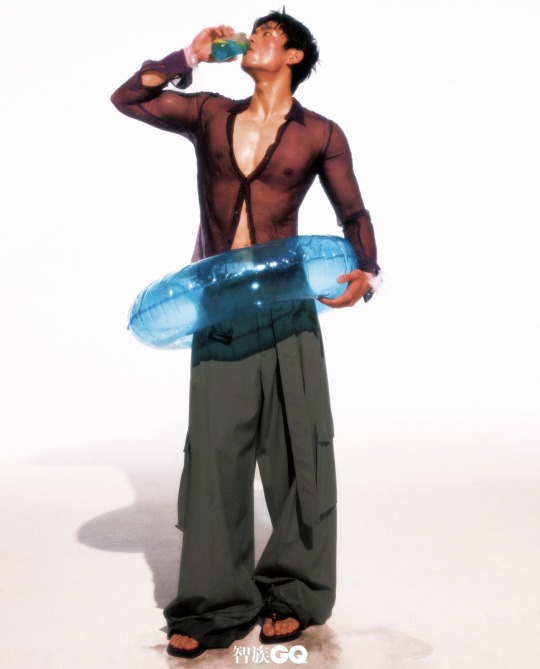
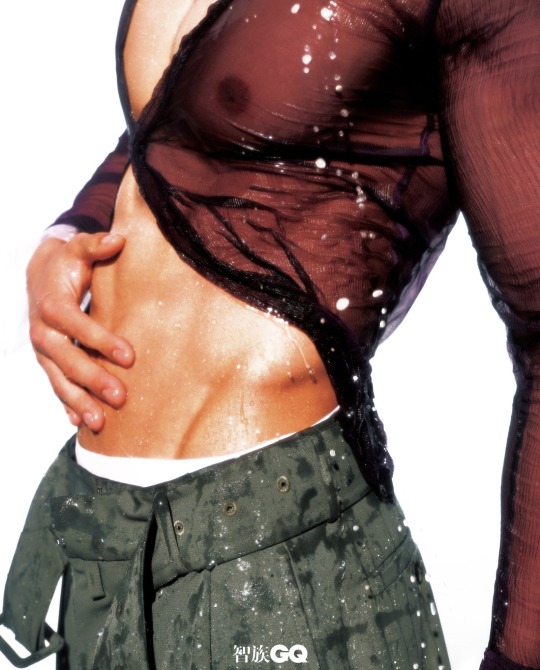





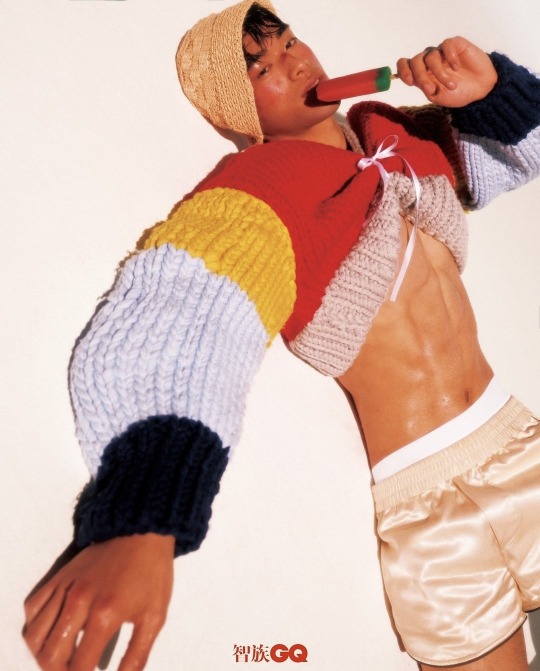
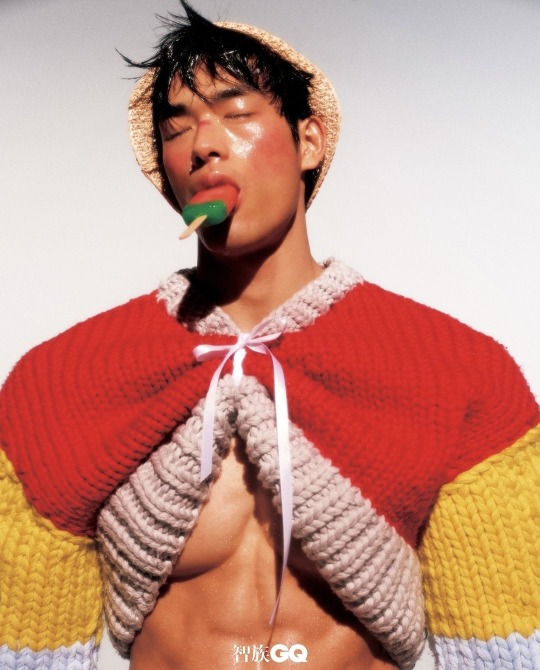

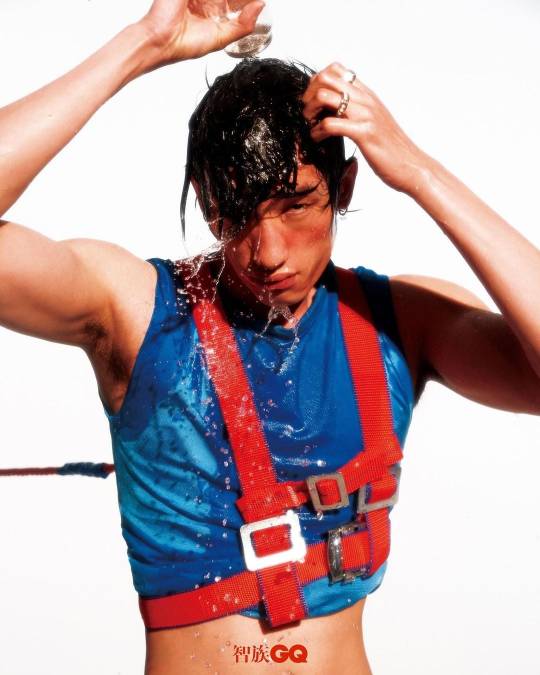

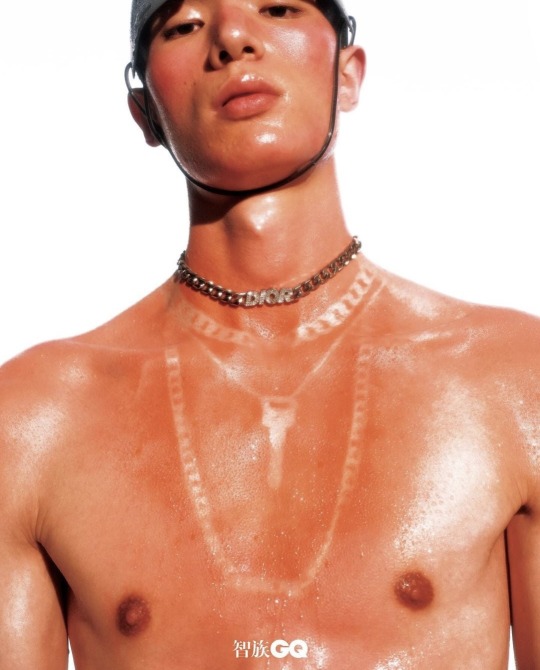
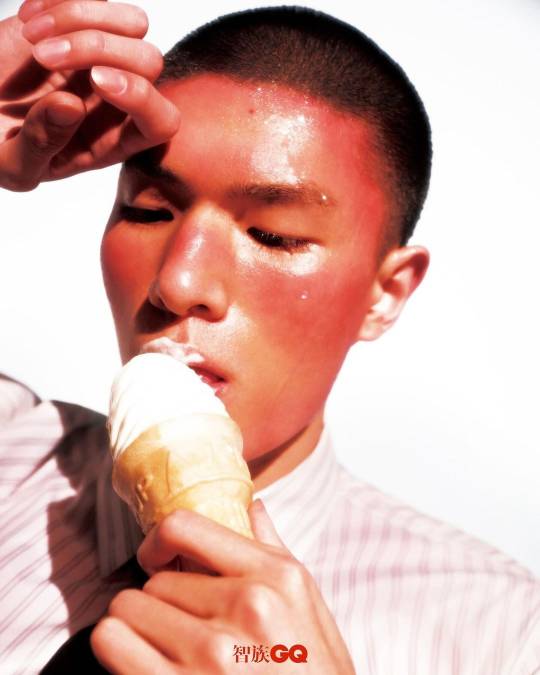
make men slutty again.
HEAT STROKE | GQ CHINA Photographer: Wintam; Editor & Image: Shawn Gao Ding; Makeup: Lucas; Hair: Tao Liu; Art: Grade 2 & Lei Min; Art Assistant: Jiang Mi; Models: Kim; Ye Hao, Yu Hang, Ho Jun; Fashion Assistant: Yiyi, Coco; Photography Assistant: Li Zhenxi; Song Luanyi
bonus as rightfully added by @polyabathtub:
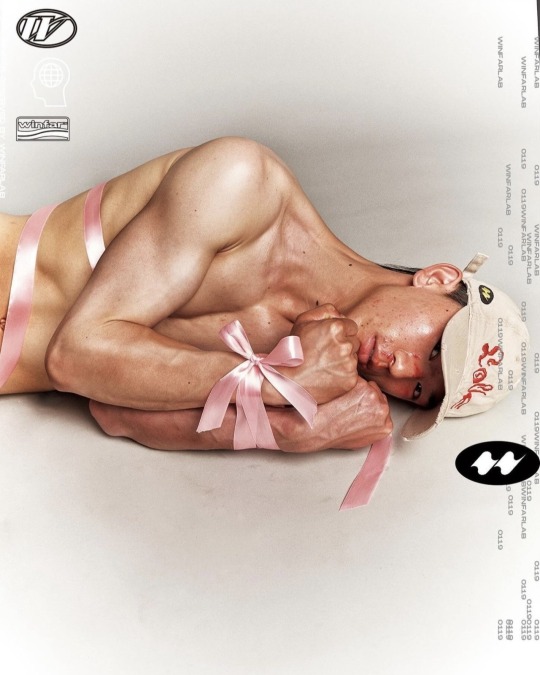
#men in heat so true so true…. 2024 year of the omegaverse.#guess who finally got her copy of the magazine and hasn't stopped re-opening it to stare at this entire shoot#the little pink bows on that beautiful beautiful man (ye hao)........#the fashion magazines in china and korea are doing such beautiful work#i loveeee wintam's work#more of the shoot over insta: wintam0119#also not to hockey on this but tyler seguin you would love this photoshoot#wintam#win tam#photography#fashion#art#long post
25K notes
·
View notes
Text
the angel staying over at my house asked for a nightlight in their room and i told them buddy, don't you produce your own light? what're you gonna do with more? and they said they wanted to see why people like it so much. and also that the nightlight i own is blue and they've been trying to understand color. anyways i think they've stared at it for an hour now
#pig originals#i am going to add to this tomorrow. don't know what this means yet but it's something#unreality#<- just in case. let me know if this needs any other tags#pig pens#hello i think the title for this will be 'the angel staying over at my house'. yes it is long i know
67K notes
·
View notes
Text




patrol is fun :DD
#akpsdj this took so long#NOT SHIP ART !!!!!#stephanie brown#steph brown#spoiler#jason todd#red hood#dick grayson#nightwing#yes nightwing is supposed to be in that peter griffin death pose#damian wayne#robin#dc fanart#illustration#batfamily#batfam#batman#dc comics#ash's doodlings#tw food#u can see the progression of my tiredness lmao#the first one panel is so detailed compared to the last one
29K notes
·
View notes
Text
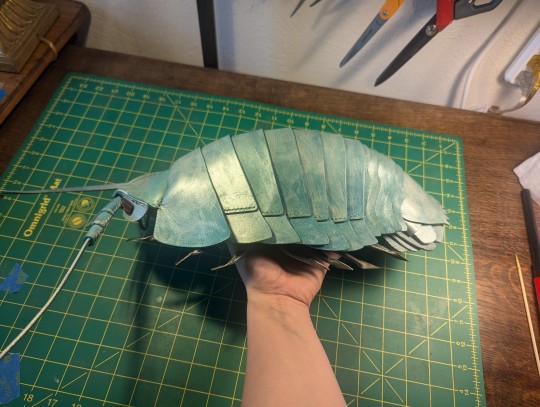
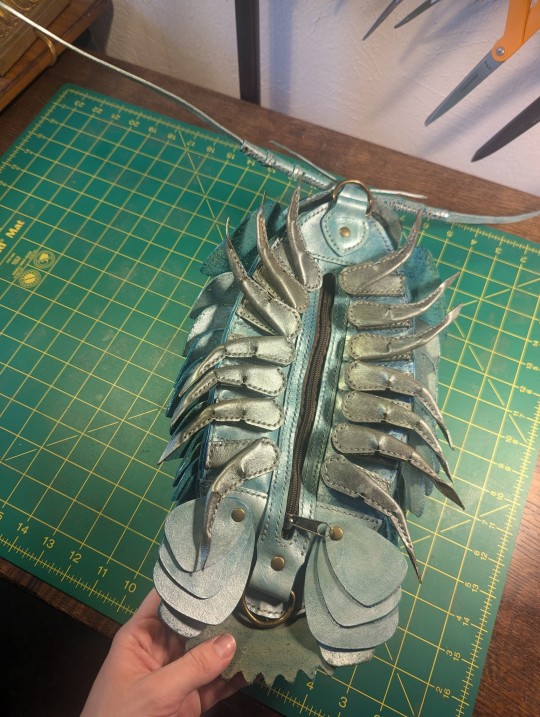
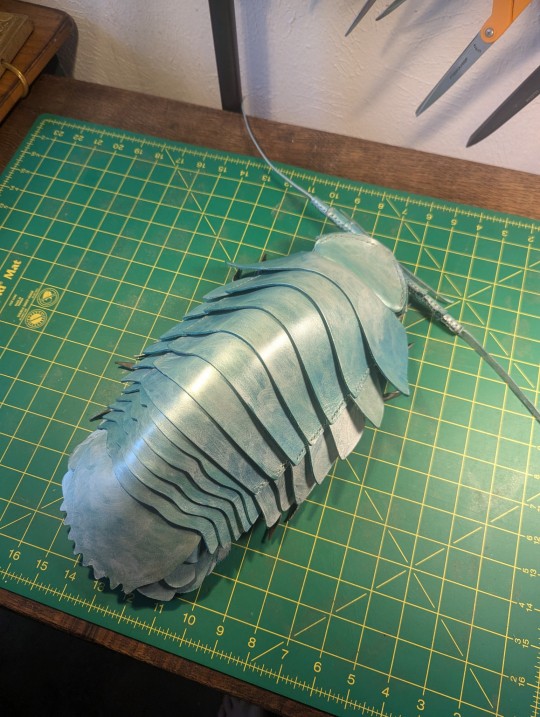
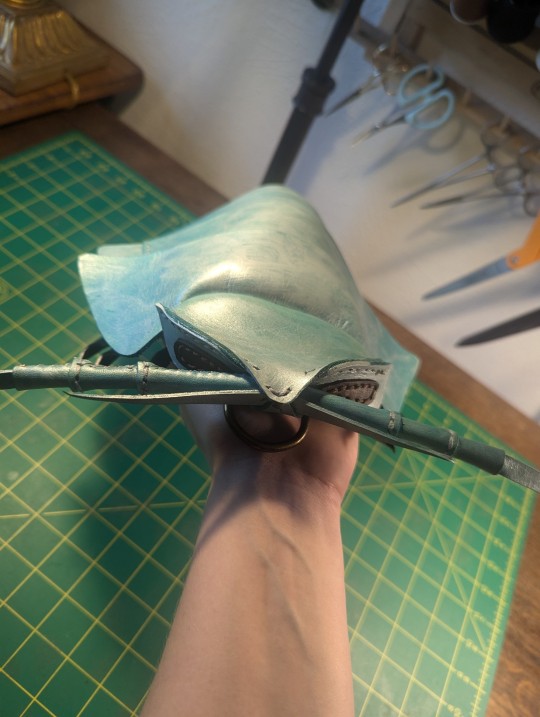
here's my wonderful isopod child, handcrafted in leather
#art#leatherworking#isopod#marine life#he was super fun to make and i learned quite a bit#honestly id love to make another#id need to check the pattern designers website but i think im allowed to sell these as long as i repurchase the pattern every few sales#if thats the case i'd totally take commissions to make these#its a lot of work but its fun!#also yes he is a bag#there are attachments for a strap and a zipper on the bottom#ill reblog and link to the pattern i used if anyone wants to know where i got it
18K notes
·
View notes
Text
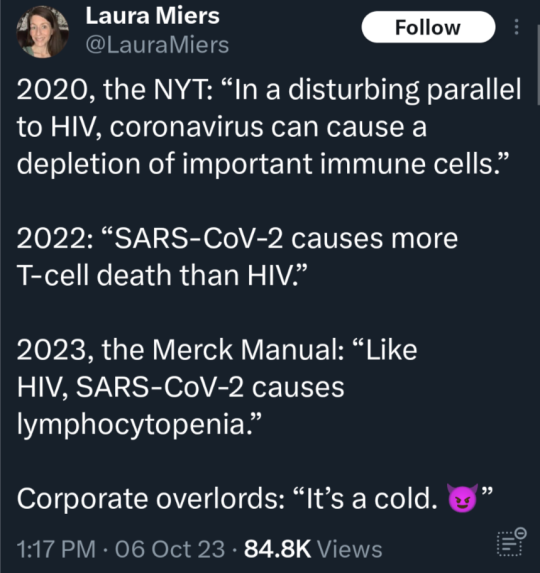
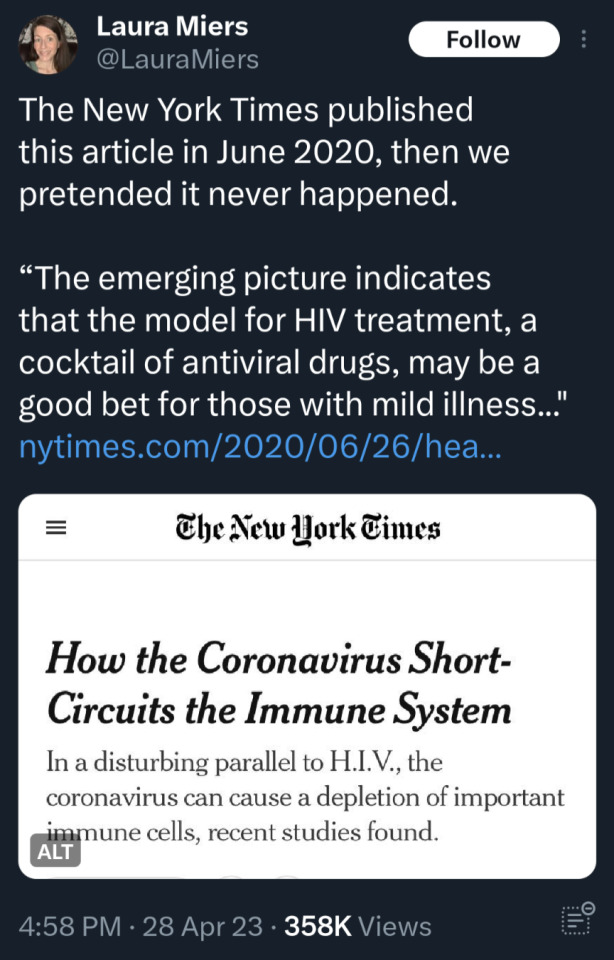

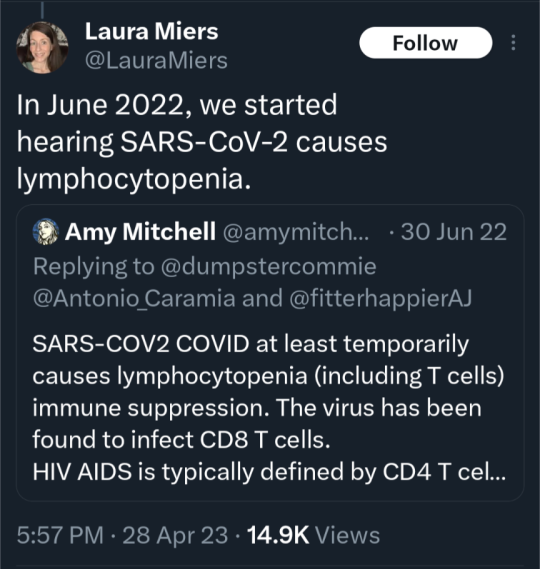
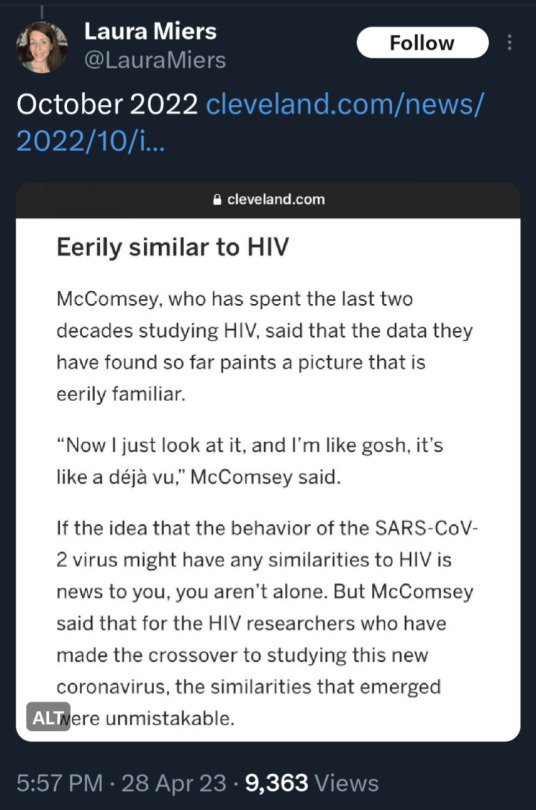
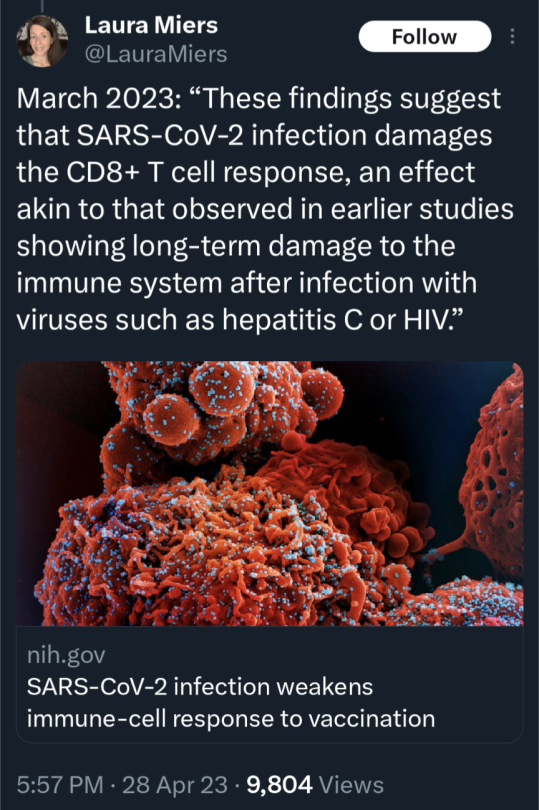
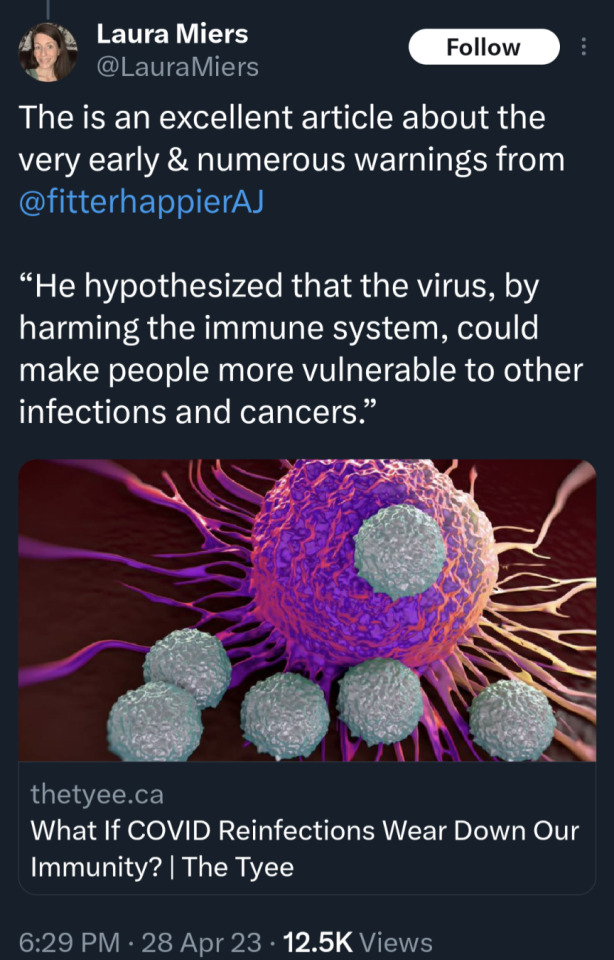
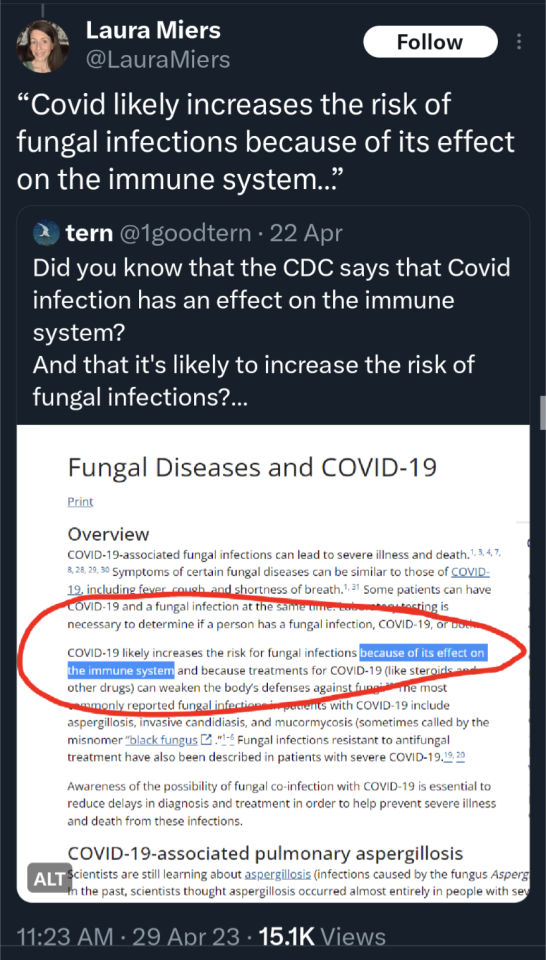
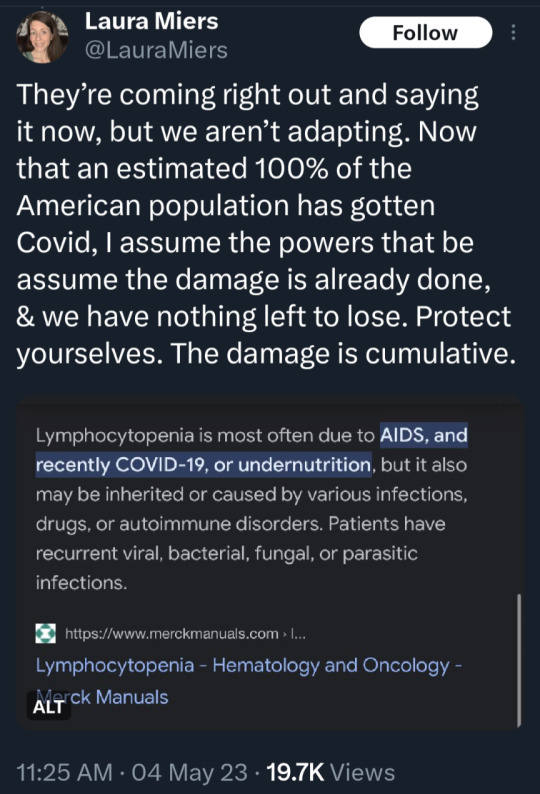
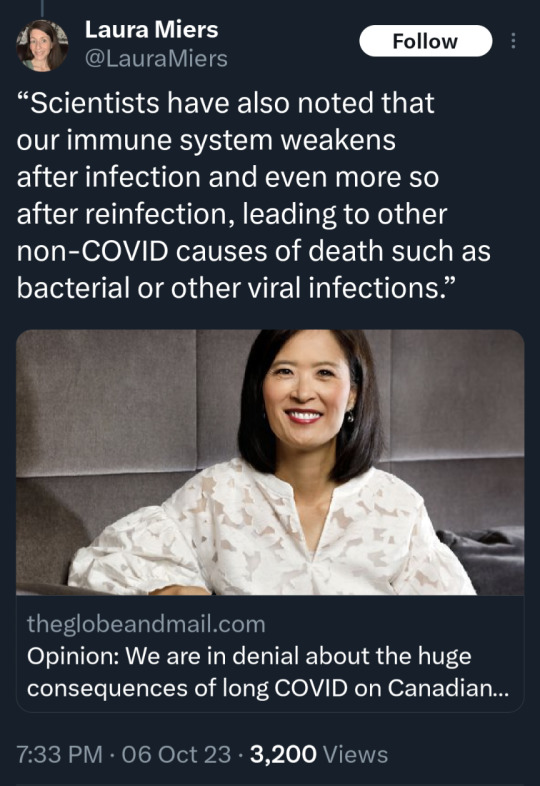
(source)
#covid 19#coronavirus#news#science#please get vaccinated#please get the booster#please stay safe#covid is not over#covid is not a hoax#please look out for each other#covid--19#long covid#yes the covid vaccine is safe
51K notes
·
View notes
Text
I love the dramatic, triumphant reveal that wolverine and deadpool survived the time ripper, mainly because i'm 1000% sure wade heard paradox monologuing™️ and was like "nonono hold on we have to wait for the Right Moment" and logan, who is 7 different kinds of exhausted at this point, was like "....yeah ok lol"
which leads to 2 grown ass men hiding behind a corner just waiting to ruin this british man's afternoon? logan really went from “i'll kill u with my teeth” to “yea sure i'll commit to your stupid bit” in like 2 days, honestly what a lad
#wade: the editors have to queue the soundtrack wolvie!!#logan in the tones of a long suffering yet fond spouse: yes dear#anyway I love this movie 10/10#deadpool and wolverine#deadpool & wolverine#Deadpool#wolverine#wade wilson#logan howlett#poolverine
11K notes
·
View notes
Text
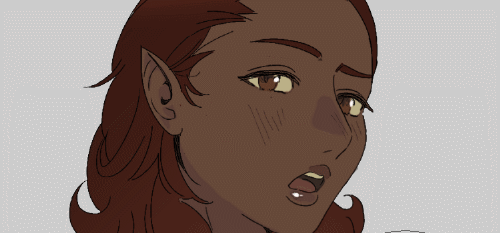

They're done: the Forbidden Halftone Brush Pack of your dreams.
Nine free halftone brushes for Clip Studio Paint. I will not be making another set of these so grab 'em now or never. Upload instructions are included in the folder! Thanks for your support! 😭
Past Freebie Brushes | Subscriber Brushes | And My Brush Tag
#my art#patreon stuff#how long did these take: yes#I clocked in to make these and I locked in to make these
20K notes
·
View notes
Text

Man can't enjoy nothing without that damn nosey jealous bitch ruining it 🙄
#billford#gravity falls#fiddauthor#yes this is also fiddleauthor to me#fiddleauthor#my art#bill cipher#ford pines#book of bill#im not the best at painting nor painting bgs dont stare at it fir too long lol..
10K notes
·
View notes
Note
Rowling isn't denying holocaust. She just pointed out that burning of transgender health books is a lie as that form of cosmetic surgery didn't exist. But of course you knew that already, didn't you?
I was thinking I'd probably see one of you! You're wrong :) Let's review the history a bit, shall we?
In this case, what we're talking about is the Institut für Sexualwissenschaft, or in English, The Institute of Sexology. This Institute was founded and headed by a gay Jewish sexologist named Magnus Hirschfeld. It was founded in July of 1919 as the first sexology research clinic in the world, and was run as a private, non-profit clinic. Hirschfeld and the researchers who worked there would give out consultations, medical advice, and even treatments for free to their poorer clientele, as well as give thousands of lectures and build a unique library full of books on gender, sexuality, and eroticism. Of course, being a gay man, Hirschfeld focused a lot on the gay community and proving that homosexuality was natural and could not be "cured".
Hirschfeld was unique in his time because he believed that nobody's gender was either one or the other. Rather, he contended that everyone is a mixture of both male and female, with every individual having their own unique mix of traits.
This leads into the Institute's work with transgender patients. Hirschfeld was actually the one to coin the term "transsexual" in 1923, though this word didn't become popular phrasing until 30 years later when Harry Benjamin began expanding his research (I'll just be shortening it to trans for this brief overview.) For the Institute, their revolutionary work with gay men eventually began to attract other members of the LGBTA+, including of course trans people.
Contrary to what Anon says, sex reassignment surgery was first tested in 1912. It'd already being used on humans throughout Europe during the 1920's by the time a doctor at the Institute named Ludwig Levy-Lenz began performing it on patients in 1931. Hirschfeld was at first opposed, but he came around quickly because it lowered the rate of suicide among their trans patients. Not only was reassignment performed at the Institute, but both facial feminization and facial masculization surgery were also done.
The Institute employed some of these patients, gave them therapy to help with other issues, even gave some of the mentioned surgeries for free to this who could not afford it! They spoke out on their behalf to the public, even getting Berlin police to help them create "transvestite passes" to allow people to dress however they wanted without the threat of being arrested. They worked together to fight the law, including trying to strike down Paragraph 175, which made it illegal to be homosexual. The picture below is from their holiday party, Magnus Hirschfeld being the gentleman on the right with the fabulous mustache. Many of the other people in this photo are transgender.
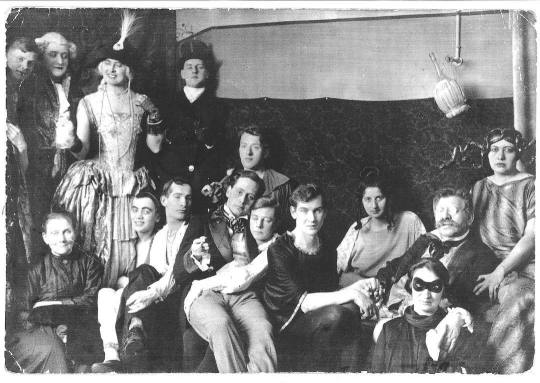
[Image ID: A black and white photo of a group of people. Some are smiling at the camera, others have serious expressions. Either way, they all seem to be happy. On the right side, an older gentleman in glasses- Magnus Hirschfeld- is sitting. He has short hair and a bushy mustache. He is resting one hand on the shoulder of the person in front of him. His other hand is being held by a person to his left. Another person to his right is holding his shoulder.]
There was always push back against the Institute, especially from conservatives who saw all of this as a bad thing. But conservatism can't stop progress without destroying it. They weren't willing to go that far for a good while. It all ended in March of 1933, when a new Chancellor was elected. The Nazis did not like homosexuals for several reasons. Chief among them, we break the boundaries of "normal" society. Shortly after the election, on May 6th, the book burnings began. The Jewish, gay, and obviously liberal Magnus Hirschfeld and his library of boundary-breaking literature was one of the very first targets. Thankfully, Hirschfeld was spared by virtue of being in Paris at the time (he would die in 1935, before the Nazis were able to invade France). His library wasn't so lucky.
This famous picture of the book burnings was taken after the Institute of Sexology had been raided. That's their books. Literature on so much about sexuality, eroticism, and gender, yes including their new work on trans people. This is the trans community's Alexandria. We're incredibly lucky that enough of it survived for Harry Benjamin and everyone who came after him was able to build on the Institute's work.
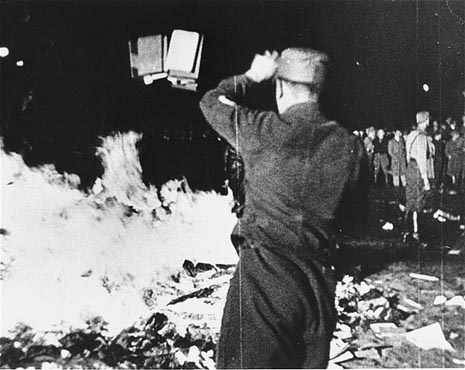
[Image ID: A black and white photo of the May Nazi book burning of the Institute of Sexology's library. A soldier, back facing the camera, is throwing a stack of books into the fire. In the background of the right side, a crowd is watching.]
As the Holocaust went on, the homosexuals of Germany became a targeted group. This did include transgender people, no matter what you say. To deny this reality is Holocaust denial. JK Rowling and everyone else who tries to pretend like this isn't reality is participating in that evil. You're agreeing with the Nazis.
But of course, you knew that already, didn't you?
Edit: Added image IDs. I apologize to those using screen readers for forgetting them. Please reblog this version instead.
#transgender#trans history#transsexual#transphobia#Magnus Hirschfeld#holocaust#holocaust denial#book burning#j.k. rowling#jk rowling#just in case you missed what i mean by all this: go fuck yourself anon :)#trans people have always existed#and we will always exist#if you really wanna pick a fight with me over well-documented history then you better bring in some sources to back your shit#queer history#queer#lgbt+#lgbta+#lgbt#lgbt history#edit: i finally got around to those damn image IDs. i am so very sorry for totally forgetting that's my bimbo moment of the month#also real quick i thought about adding an image of the actual building but the only one i can find has a Nazi parade in front of it#it was taken the day of the book burning raid and honestly if i were to include it then i'd add it to the first few paragraphs#and i think the story's better told when you uphold the hope Magnus Hirschfeld and all the researchers he worked with had#also keeps being brought up: yes Hirschfeld was a eugenicist. it was a popular belief set that was only discredited after WW2#Hirschfeld died in 1935. he literally didn't live long enough to see science turn against those beliefs and practices#considering how he changed his mind on transitions i like to think he would've changed his mind on eugenics too if he'd lived
17K notes
·
View notes
Text




No Mercy.
#lucifer morningstar#alastor the radio demon#hazbin hotel#Radioapple#well not really#or maybe yes#appleradio#long post#ish#my stuff
8K notes
·
View notes